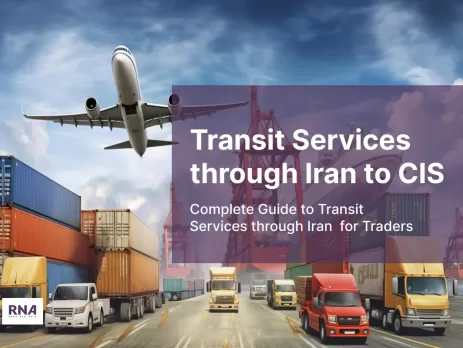In today’s competitive trade world, finding the fastest, safest, and most cost-efficient route to deliver goods to CIS countries is essential. Iran’s geographic location, linking the Persian Gulf to Central Asia, makes it a key player in international logistics.
Transit services through Iran to CIS countries give traders and logistics companies a dependable route connecting Asia, the Middle East, and Europe. Whether you are shipping agricultural products, industrial goods, or raw materials, Iran acts as a key gateway that cuts both transit time and costs to CIS destinations.
Understanding Transit Services through Iran to CIS
Transit services through Iran to CIS involve transporting goods that enter Iran’s ports or borders. These goods then move across the country to Central Asian markets like Kazakhstan, Uzbekistan, Turkmenistan, Tajikistan, and Kyrgyzstan.
This process of Transit Services through Iran to CIS includes:
- Cargo transportation through Iran using road, rail, or multimodal routes
- Customs clearance for CIS-bound cargo in Iran
- Coordination with freight forwarding services to CIS countries
- Real-time tracking and transparent reporting
Iran has become a crucial part of the Iran-CIS logistics corridor, connecting southern seaports like Bandar Abbas and Chabahar to northern border points such as Sarakhs, Incheh Borun, and Lotfabad.
You can learn more about freight forwarding process in this guide: The Complete Freight Forwarding Process in Iran
Major Transit Routes from Iran to CIS Countries
The transit routes from Iran to CIS countries are varied, letting traders pick the best path for their cargo based on time, cost, and destination. The key routes include:
1. Bandar Abbas – Sarakhs Route
- Connects the Persian Gulf to Turkmenistan and Uzbekistan
- Suitable for bulk and containerized shipments
- Ideal for traders in India, China, and the UAE shipping goods to Central Asia
2. Chabahar Port – Lotfabad / Incheh Borun
- Provides direct access to Kazakhstan and Russia through Turkmenistan
- Preferred for food and livestock cargo
- Supported by trade transit services in Iran offering customs, storage, and forwarding solutions
3. Road and Rail Network
- The Iranian rail system connects southern ports to northern borders seamlessly
- Combined road-rail solutions lower total transit costs and increase speed
Each route is supported by international freight transit via Iran, ensuring a stable and predictable supply chain for regional trade.
Why Choose Iran for Your CIS Trade Transit?
Using transit services through Iran to CIS countries brings several practical advantages for international traders.
1. Strategic Location
Iran connects the Persian Gulf and the Caspian Sea, offering land access to Central Asia. It serves as one of the shortest and safest land routes between the Middle East and CIS countries.
2. Cost Efficiency
Compared to sea routes via Europe or long overland paths through Russia, the Iran-CIS logistics corridor significantly reduces both distance and fuel costs.
3. Reliable Infrastructure
Iran has developed strong road and rail systems supported by advanced customs and logistics services. Major terminals like Bandar Abbas, Imam Khomeini Port, and Chabahar handle thousands of tons of cargo every day.
4. Simplified Customs Process
With customs clearance for CIS-bound cargo in Iran, traders experience fewer delays and transparent documentation processes; Especially when managed by experienced logistics partners like Rasta Nik Asia.
5. Trade Diversity
Iran handles a wide range of goods for CIS markets, including:
- Agricultural and food products
- Livestock feed and animal goods
- Industrial machinery and spare parts
- Construction materials
 How to Transport Goods from Iran to CIS Countries
How to Transport Goods from Iran to CIS Countries
If you’re planning to start using transit services through Iran to CIS, here’s a practical overview of how the process works:
Step 1: Cargo Arrival in Iran
Goods typically arrive at southern ports such as Bandar Abbas or Chabahar via sea freight. For nearby countries like Turkey or the UAE, cargo may also enter by road.
Professional logistics providers manage all customs formalities, ensuring compliance with Iranian and CIS trade regulations.
Required documents include:
- Commercial invoice and packing list
- Bill of lading
- Certificate of origin
- Transit declaration
Step 3: Inland Transportation
Cargo is moved via Iran’s road and rail network toward the northern borders.
- Rail transit is suitable for bulk goods and large shipments.
- Road transit offers flexibility and faster handling for perishable or time-sensitive items.
You can learn all about rail freight and truck transport trough Iran in this guide: Truck vs Rail Transport in Iran: Which Is Better for You?
Step 4: Border Transfer and Delivery
At border crossings such as Sarakhs, Lotfabad, or Incheh Borun, cargo is transferred into the CIS customs system for final delivery.
Partnering with a trusted company offering freight forwarding services to CIS countries helps ensure a seamless process from port to destination.
Best Route for Cargo Transit through Iran
The best route for cargo transit through Iran depends on your shipment’s type, destination, and origin. Here are some quick recommendations for your global trade:
| Cargo Type | Ideal Route | Notes |
| Food & Agricultural Goods | Chabahar to Turkmenistan to Uzbekistan | Fast and safe for temperature-sensitive products |
| Industrial Machinery | Bandar Abbas to Sarakhs to Kazakhstan | Efficient for large-scale shipments |
| Containerized Cargo | Bandar Abbas to Incheh Borun to Russia | Suitable for multimodal shipping |
Consulting with Rasta Nik Asia’s logistics team ensures you choose the most efficient transit route from Iran to CIS. You can easily call us or send us an Email and we will reach you as soon as possible.
Benefits of Using Iran for CIS Trade Transit
Choosing transit services through Iran to CIS offers numerous advantages like:
- Reduced shipping time compared to Europe-based routes
- Lower overall logistics costs
- 24/7 customer support and shipment tracking
- Experienced teams for customs handling and cargo documentation
- Strong network of local representatives at every major border crossing
Rasta Nik Asia’s team ensures each shipment reaches its destination safely and on time, offering peace of mind for global traders. Call us today to get more detailed information about Transit Services through Iran to CIS.
Transit Time and Cost from Iran to CIS
Transit time varies depending on the route and type of cargo, but on average:
- By road: 5–10 days to reach Central Asia
- By rail: 8–14 days, depending on customs and coordination
Factors affecting transit cost from Iran to CIS include:
- Cargo weight and volume
- Mode of transport (road, rail, or combined)
- Type of goods (general, refrigerated, or hazardous)
- Distance to the final CIS destination
For an accurate cost estimate of Transit Services through Iran to CIS, contact Rasta Nik Asia for a tailored quote.
Conclusion: Partner with Rasta Nik Asia for Transit Services through Iran to CIS
Choosing the right logistics partner is key to successful transit services through Iran to CIS countries. With decades of experience, multilingual communication, and transparent reporting, Rasta Nik Asia ensures your cargo moves efficiently across Iran’s trade corridors.
Ready to ship your cargo through Iran?
Contact Rasta Nik Asia today for expert guidance, fast quotations, and reliable end-to-end logistics solutions.

